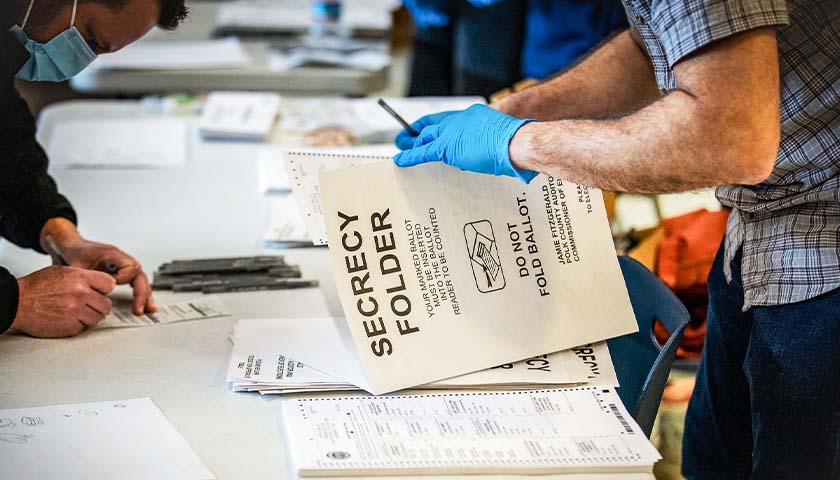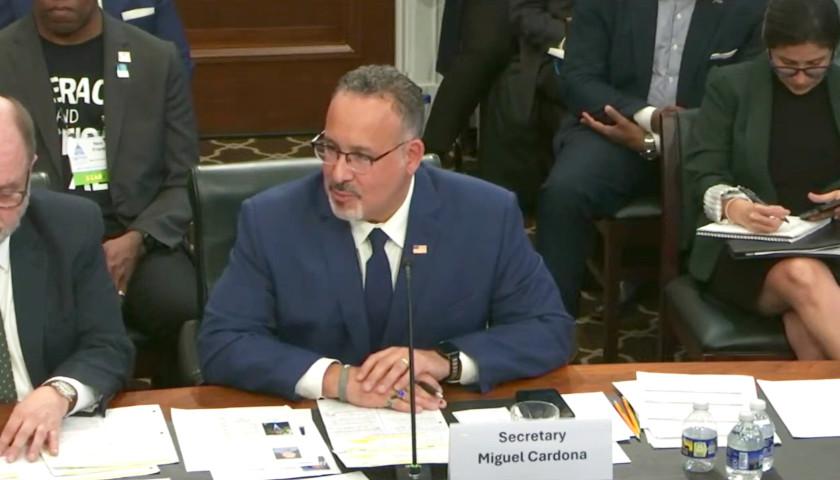We the People AZ Alliance (WPAA) filed a lawsuit against Maricopa County on April 25 for refusing to fulfill their public records request for ballot envelopes containing signatures from the 2022 election. The Verified Complaint for Statutory Special Action to Secure Access to Public Records From Defendants stated that the public records request was submitted on April 5 and denied by the county on April 10.
WPAA tweeted about the rejection on Wednesday, “A.R.S. 16-168(F) is not a catch to hide information from the public. Signatures are filed on deeds, court documents and licenses and made public. Ballot affidavit envelopes are not by design part of a voter record, we are committed to bringing the truth to light.”
According to the lawsuit, filed by Brian Blehm, who is also representing Kari Lake in her election litigation, the county told WPAA that it could not turn the envelopes over because doing so would violate A.R.S. 16-168(F). That law governs how voter registration records must be handled and includes a public inspection provision. It states in part, “Nothing in this section shall preclude public inspection of voter registration records [after redaction] at the office of the county recorder for the purposes prescribed by this section … for signature verification on petitions and candidate filings, for election purposes and for news gathering purposes by a person engaged in newspaper, radio, television or reportorial work.”
The lawsuit said that WPAA fits into the exception carved out by the statute to view the records, describing the organization as “a reportorial agency that strives to reduce governmental corruption through increased public transparency and public accountability.”
The complaint pointed out that progressive groups are granted broad access to voter registration records due to how lenient the statutes are. “Unlike the absolute prohibition on release of ballots and ballot images by A.R.S. § 16-625, A.R.S. § 16-168(F) offers a wide range of exemptions, including highly partisan groups currently allowed access to the voter registration database by the Secretary of State, including Arizona Center for Disability Law, Arizona Student Association, Chicanos Por La Causa, Equality Arizona Foundation, Inspire2Vote – Project High Hopes, Mi Familia Vota, One Arizona, Phoenix Indian Center, Rock the Vote, and The Civics Center,” the complaint stated.
The complaint said that the county denied WPAA access due to the “best interest of the state,” but didn’t say what it was. The complaint pointed out that various members of the public view the signatures on the envelopes, so there’s no reason they must be kept secret. “During its travels to Maricopa County, the affidavit envelope is handled by an unknown number of the public, including postal workers, private citizens, and employees of Runbeck, a private corporation retained to process and perform signature verification on affidavit envelopes.”
Blehm also asked Runbeck Election Services for video from the day after the election of their loading dock and loading dock warehouse, but the company refused to turn it over. Runbeck handles ballot processing for Maricopa County.
Runbeck stated that because it is a private entity, it is not subject to public records laws. Blehm argued that Runbeck is a “public body” because it “expend[s] and/or [is] paid monies by the state and/or a political subdivision thereof in furtherance of the state and/or political subdivision’s goals.”
Blehm tweeted about the lack of transparency from Runbeck, prompting Maricopa County Recorder Stephen Richer to respond. Blehm said, “Hey Maricopa County, Runbeck’s facility is about 150,000 square feet & it conduct about 80% of your election over a month long period of time. A county employee is only allowed in for one day. You have no control or oversight over your centralized elections.”
WPAA issued a statement in response to Richer, and tweeted, “We the People AZ requested footage of Runbeck’s loading docks and they are refusing to comply. Counties across the country use the services of Runbeck. Is this so they can hide from their public transparency obligation?”
We the People AZ requested footage of Runbeck's loading docks and they are refusing to comply. Counties across the country use the services of Runbeck. Is this so they can hide from their public transparency obligation? https://t.co/ZTFfaeYm5d
— We the People AZ Alliance (@WethePeopleAZA1) April 28, 2023
In its statement responding to Richer, WPAA accused the recorder of saying things that were incorrect. Richer tweeted, “You can watch ALL election rooms online 24/7/365.” APAA shot back, “there are NO publicly accessible camera links to the inside of the Runbeck facility. … Proof of this is in all the pics of election work taking place in OFF camera areas at MCTEC plastered all over your twitter page.”
WPAA said Richer’s defense that “County employees work there every day” wasn’t adequate, because “County employees are not the same as party observers.” Richer claimed that “Political party observers are involved in every process,” but WPAA said that was false. “One or two observers per shift on election day is not what any honest person would say “involved in every process.”
WPAA concluded, “What is really wrong here Mr. Richer, is that you and your colleagues refuse to employ any honest, ethical, common-sense forms of communication with your constituents. You habitually choose to respond to legitimate concerns of the public by lying, gaslighting, ridiculing and deflecting.”
WPAA has completed considerable work investigating election fraud in Arizona. Led by Shelby Busch and Steven Robinson, the organization provided testimony to the Arizona Senate Election Committee earlier this year regarding thousands of ballots lacking chain of custody and thousands of signatures improperly verified. These are violations of the state’s Election Procedures Manual, which are class 2 misdemeanors.
Read the complaint:
– – –
Rachel Alexander is a reporter at The Arizona Sun Times and The Star News Network. Follow Rachel on Twitter. Email tips to [email protected].
Photo “Election Day 2020” by Phil Roeder. CC BY 2.0.









Everyone knows that another dem seized a government office for their own purposes, and not to represent the people who live under their rule. It’s so sad that our Nation has been taken over by these people and the bad actors with tons of money, and the media who will say anything to help them! It’s a devastating blow for the citizens of our Country.
Apply nationwide OK Yes